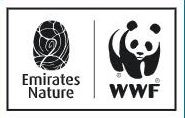Agent of Change: Why do we throw away food scraps?
The Waste Lab’s co-founder Ceylan Uren talks about the significance of food scraps and her mission to simplify composting in the UAE. 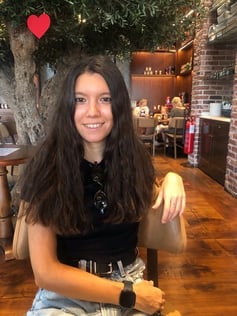
During the holy month of Ramadan, we shared stories of real people tackling food waste in their farms and kitchens, by changing their diets and by growing their own food. As you return to your daily routines, we invite you to continue Shopping Smarter, Cooking Smarter and Eating Smarter so that you too #SaveOneThird of food from going waste.
We also challenge you to pick up an additional good habit – composting! As The Waste Lab’s Ceylan says, “It’s already 2021!” Now is the time to reshape our relationship with food waste.
Emirates Nature-WWF: Why does composting matter?
Ceylan Uren:
Compost is one of the most beautiful processes that I have seen in my life. It’s empowering and magical to think we can create soil from our own waste.
We routinely throw away things, without thinking. As we consume more and more, and fill up our landfills, we need to pause and ask – what are we throwing away? Where is this going? What else can we do with them? 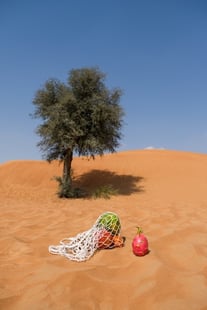
If we continue our current disposal habits, Dubai would need as much land as two Palm Jumeirah islands by 2050, just for extra landfill needs.
When it comes to materials like plastic and glass, we have been taught over years to recycle. Everyone knows that we should recycle, that we can repurpose these materials. It is known.
But when it comes to organic waste, we don’t have these conversations. Individually, we cook at home and throw away food scraps and excess food without thinking twice. But we should be asking: ‘Why are we throwing them away?’
Our organic waste – fruit and vegetable peels, seeds, excess food – still has nutrients and life. It can be repurposed to play a much larger role in our lives.
We can use organic waste to make compost and heal our soil. As our soil becomes healthier, we can talk about scaling up food security and growing more local produce.
Emirates Nature-WWF: Why aren’t more people in the UAE composting? Can you tell us about the barriers and challenges people face?
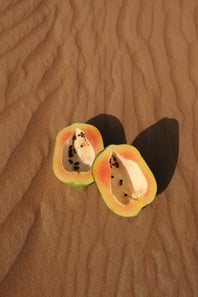 Ceylan: Compost needs maintenance, time, space and knowledge. If you are working full time or have a family, it can be difficult to maintain this in the long term.
Ceylan: Compost needs maintenance, time, space and knowledge. If you are working full time or have a family, it can be difficult to maintain this in the long term.
There are different ways to compost, each with their pros and cons according to the resources that someone has. We’ve tried our own compost pile, bokashi and even a vermicompost – while living in apartments in Dubai! So, we know the pain points of our future users.
A lot of people, especially those in apartments, use bokashi. They add microbial activity to ferment the waste. But this is not the end product and still needs to be buried under soil to complete the composting process. Many people do not have space to bury this and have to throw it away. After all this effort, seeing or hearing this is sad. It might not be realistic to expect everyone who has a backyard or outdoor area to turn it into a compost / growing area; however, we strongly suggest considering even at a small scale. It is totally worth it.
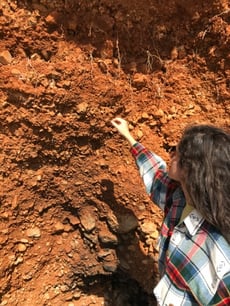 We’ve spoken to people who have given up for many reasons – the weather is too hot, it requires too much effort, it’s smelly, it attracts pests and so on.
We’ve spoken to people who have given up for many reasons – the weather is too hot, it requires too much effort, it’s smelly, it attracts pests and so on.
Another challenge is choosing what to put inside the compost pile or bin. It’s tempting to put all organic waste in the pile. But it doesn’t work that way. Some items can upset the balance of the microbial activity or Carbon to Nitrogen ratio in the compost.
That’s why The Waste Lab was founded, to support and empower people with practical solutions.
Emirates Nature-WWF: How does The Waste Lab make it easier to compost?
Ceylan:
The Waste Lab is a passion-driven project that was started with my co-founder, Lara Hussein. We asked ourselves how we could tackle the problem of waste and specifically how we could rescue food scraps.
The Waste Lab will be a subscription-based service offered to households, hotels, restaurants and anyone who would like participate. We ask you to separate your organic waste at source with our provided guidelines and support, and we will handle the rest.
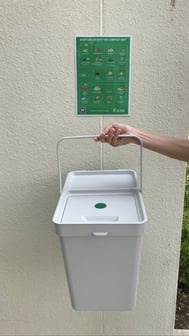
We will provide bins and starter kits, collect bins weekly or biweekly and in return provide clean bins, so people don’t even have to clean their own bins. We will weigh all the bins received and check the waste that is inside. The purer the ingredients of the compost are, the better the quality in the end.
Collected waste will then be composted. We will even offer a service to collect fermented matter from those who use bokashi in their homes, and bury it so that it becomes compost. And they can get compost back at the end if they want to.
Emirates Nature-WWF: How will you motivate people to establish composting as a new habit?
Ceylan: We plan to offer rewards to motivate our customers to compost continuously. We will also collect data at every step of the way so that we can produce impact reports and show people how their actions actually make a tangible difference.
We want people to see the amount of food scraps that are rescued, how much healthy soil they are creating and how much matter they are keeping out of landfills.
The Waste Lab will also create more awareness about composting through workshops and activities so that we can all grow as a community. Afterall, the more connected we are, the bigger and better our impact.
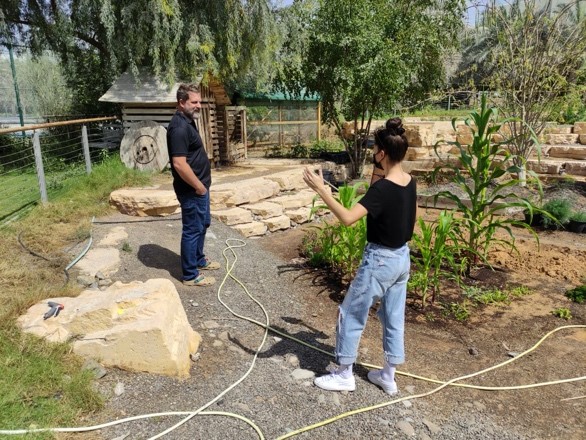
Emirates Nature-WWF: Where are you in your journey, and what’s your vision for the future?
Ceylan: We are currently at initial stages of launch and will roll out a pilot project in The Sustainable City of Dubai in the coming weeks. Once we have a successful pilot, we will launch officially and work with more households, communities and brands. 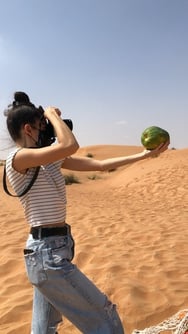
In five years, we would like to see less waste going to landfills, more healthy and fertile soil, and an active community of people supporting one another here in the UAE. We would also love to grow our own chemical-free food.
Emirates Nature-WWF: What advice do you have to people who are interested in rescuing their organic waste?
Ceylan: Food scraps have a purpose – they protect the food we eat and they have their own life cycle. When you understand this and separate food scraps from garbage, they become a thing of beauty. They are no longer icky to touch. 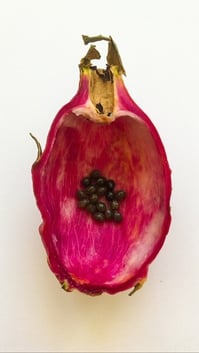
Once you start making compost, you automatically tend to reduce your food waste. This is because you are separating your waste and tracking how much you actually produce. So, when you see food, like an apple, going bad, you immediately think of ways to repurpose it.
In this way, composting directly affects your shopping list and your overall relationship with food. You see things differently and it makes you want to change your lifestyle.
To know more about The Waste Lab, follow them on Instagram at @TheWasteLab
For more Agent of Change stories, subscribe to our blog or follow us on Instagram @EWS_WWF






